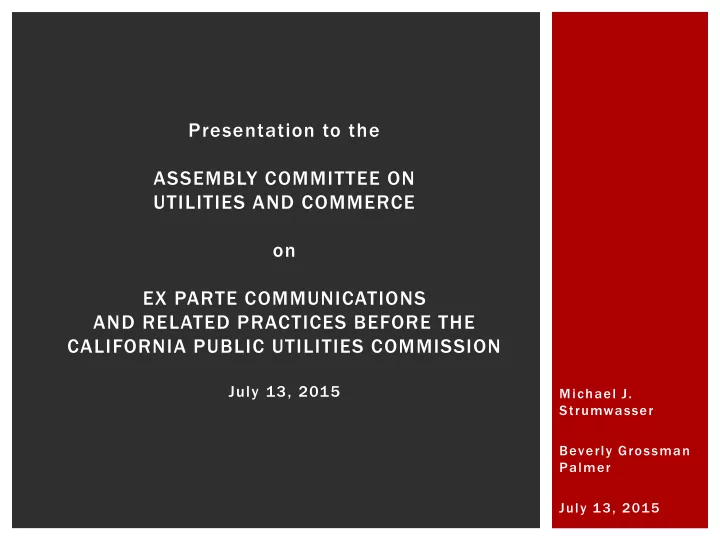

Presentation to the ASSEMBLY COMMITTEE ON UTILITIES AND COMMERCE on EX PARTE COMMUNICATIONS AND RELATED PRACTICES BEFORE THE CALIFORNIA PUBLIC UTILITIES COMMISSION July 13, 2015 Michael J. Strumwasser Beverly Grossman Palmer July 13, 2015
CPUC PROCEEDINGS AND EX PARTE PRACTICES Basic process Hearings before ALJ Proposed decision recommended to the five-member Commission for adoption “Ex parte communication” Any communication by one party, without notice to, or argument by, anyone having an adverse interest.
CPUC RULES BY TYPE OF PROCEEDING Proceeding Ty Type Rule Adjudicatory Ex parte communications are prohibited Quasi-legislative No restrictions Ratesetting It’s complicated
RULES FOR RATESETTING CASES Public c Utiliti ties es Code e § 1701.3(c 3(c): ): Ex parte communications are prohibited in ratesetting cases.
RULES FOR RATESETTING CASES Public c Utiliti ties es Code e § 1701.3(c 3(c): ): Ex parte communications are prohibited in ratesetting However, oral ex parte communications may be permitted at any time by any cases. commissioner if all interested parties are invited and given not less than three days’ notice. Written ex parte communications may be permitted by any party provided that copies of the communication are transmitted to all parties on the same day. If an ex parte communication meeting is granted to any party, all other parties shall also be granted individual ex parte meetings of a substantially equal period of time and shall be sent a notice of that authorization at the time that the request is granted. In no event shall that notice be less than three days. The commission may establish a period during which no oral or written ex parte communications shall be permitted and may meet in closed session during that period, which shall not in any circumstance exceed 14 days. If the commission holds the decision, it may permit ex parte communications during the first half of the interval between the hold date and the date that the decision is calendared for final decision. The commission may meet in closed session for the second half of that interval.
EX PARTE COMMUNICATIONS ARE PERVASIVE 21,389 total reported ex parte contacts (since March 1992) Average of 14.3 contacts per proceeding One proceeding had 1,285 reported ex parte communications
UTILITIES ARE THE MOST FREQUENT EX PARTE COMMUNICTORS (MAR 1992 – OCT 2014) No. of Ex Parte No. of Avg. Contacts / Filer Contacts Proceedings Proceeding Pacific Bell Telephone Company 1,281 105 12.20 GTE California, Inc. 263 30 8.77 CA Cable Television Association 223 31 7.19 Verizon California Inc. 188 27 6.96 AT&T Communications of California 351 51 6.88 Southern California Gas Company 955 139 6.87 California-American Water Co. 192 29 6.62 MCI Telecommunications Corp. 178 27 6.59 Southern California Edison Company 1,863 283 6.58 Pacific Gas & Electric Company 2,272 378 6.01 Independent Energy Producers Association 236 47 5.02 San Diego Gas & Electric Company 833 180 4.63 Natural Resources Defense Council 187 41 4.56 CPUC/ORA 2,325 529 4.40 Sempra Energy 206 54 3.81 Greenlining Institute, The 136 37 3.68 TURN 699 203 3.44 CA Water Service Company 98 30 3.27 Alliance For Retail Energy Markets 111 34 3.26 CA Large Energy Consumers Association 106 38 2.79
CPUC BUSINESS MEETINGS Meets 1.7 times/month in public business meetings Public portion of meeting lasts average of 2.5 hours
OTHER AGENCIES WE CONSIDERED California Other State Utility Commissions Administrative Procedure Act Florida California Coastal Commission Illinois California Energy Commission New York Pennsylvania Texas Washington Federal Agencies Federal Administrative Procedure Act Federal Communications Commission Federal Energy Regulatory Commission
MAIN DISTINCTIONS Formal Hearings Ex parte communications banned vs. Informal Proceedings Ex parte communications either permitted or permitted w/ disclosure requirements
FINDINGS
FINDING: Ex parte communications . . . . . . are a frequent, pervasive part of CPUC practice that sometimes determine the outcome of proceedings.
FINDING: Ex parte communications . . . . . . are unfair to parties.
FINDING: Ex parte communications . . . . . . undermine and deprecate the record-based decision- making process.
FINDING: Ex parte communications . . . . . . transform a legal quest for evidence-based truth into a negotiation with utilities.
FINDING: Ex parte communications . . . . . . render governmental decision-making invisible to the public.
FINDING: Ex parte communications . . . . . . make commission meetings merely ceremonial.
FINDING: Ex parte communications . . . . . . corrode government ethics.
RECOMMENDATIONS
RECOMMENDATION: BASIC POLICY #1 Prohibit substantive ex parte communications in adjudication and in ratesetting #2 Permit ex parte communications in quasi- legislative proceedings with full disclosure by decision-maker of substance of communications
RECOMMENDATION: DISCLOSURES #7 Disclosures should be the responsibility of the decision-maker, not the party (but with the party’s assistance permissible) #6 Every disclosure of an ex parte communication must include full disclosure of what the decision-maker said
RECOMMENDATION: ENFORCEMENT #12 Legislation should make decision-makers personally liable for sanctions for knowingly violating ex parte laws
RECOMMENDATION: DECISION-MAKING MECHANICS #23 In ratesetting and adjudicatory cases, retain closed sessions for Commissioner to deliberate
RECOMMENDATION: CULTURE OF COMPLIANCE #14 Require the Commission to adopt codes of conduct for decision-makers and for advocates #16 Establish an Ethics Officer to monitor and report on ex parte practices, administer the codes of conduct, develop training tools, and recommend changes in rules
Recommend
More recommend